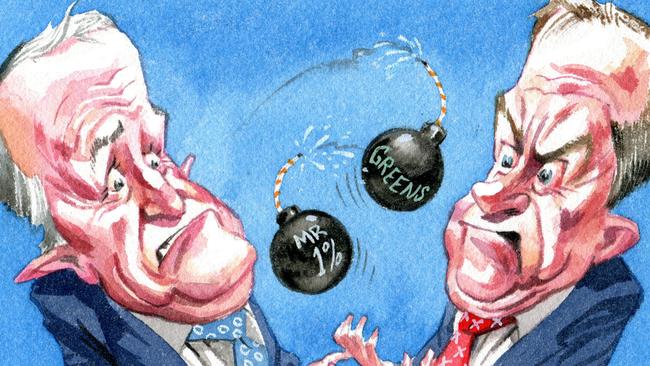Talking Point: Pollies are learning our lingo
MARTIN GRIMMER and DENNIS GRUBE: The selective use of words by political candidates can sway how we vote.

Opinion
Don't miss out on the headlines from Opinion. Followed categories will be added to My News.
DON’T think of an elephant – that’s the exhortation with which American linguist George Lakoff begins his classes each year.
Lakoff knows the first thing his students will do in response is to think of an elephant. The lesson is that in politics, as in life, words come preloaded. The politician able to set the parameters of debate – to choose what we will talk about – is ahead of the game.
It works because politics is emotional. Most voters do not sit at home with a carefully honed policy abacus on which they weigh up competing political plans before deciding how to vote. Most rely on something more visceral: an innate understanding of the brand of each party that determines where their loyalty lies. And those brands can be very resistant to evidence.
For example, under the Abbott-Turnbull Coalition government, government debt and the budget deficit have worsened significantly from the levels Abbott labelled a budget emergency when he came into office. Under the Gillard Labor government, single parents were pushed off parenting payments and on to Newstart, resulting in significant cuts to some of the nation’s poorest families.
Yet almost every poll for decades shows people trust the Liberals more on the economy and Labor more on welfare. Are we not paying attention?
Insights from marketing scholarship suggest certain features are embedded aspects of a party’s brand and, just by mentioning them, leaders can spark emotions.
That’s why Malcolm Turnbull asks: “Who do you trust to ensure our economy transitions successfully from the mining construction boom?” As soon as he mentions the economy he knows he is pulling the right rein. It’s also why Bill Shorten’s election opener was laden with phrases such as: “Trust Labor to ensure that women get a fair go. Trust Labor to make sure multinationals pay their fair share. Trust Labor to conduct budget repair that is fair.” Shorten knows that to mention fairness triggers light bulbs in potential Labor voters.
To identify the content of party brands in Australia, we surveyed more than 1200 Australians on their perception of the four main political parties. We asked a first group of voters what words came to mind when they thought of each party, and then asked a second larger group whether they thought each word or phrase was positive, negative, or neutral. The top 10 for each party (with * indicating a positive association) were:
LABOR – unions, union-dominated, working class*, large spenders, infighting, working conditions*, factions, support workers*, poor leadership, debt creators.
LIBERAL – stop the boats, pro-big business, looking after the rich, rich, liberal*, high end of town, conservative, right wing, powerful, arrogant.
NATIONAL – the Nationals*, rural*, a country party*, Coalition, supports farmers*, conservative, junior partner to the Liberals, old-fashioned, the Nats, small.
GREENS – green*, trees/forests*, climate*, greenies, protecting the environment*, minor party, supporting same-sex issues*, sustainability*, idealistic, alternative.
The results show that there are ensconced positive and negative brand associations that each party has to grapple with – and that major parties, in particular, carry a lot of negative baggage. It no longer matters whether those things are true or not because the perception alone is enough to shape political reality. Like car enthusiasts who choose between Holden and Ford, political brand choices build on deeply ingrained associations that cannot be easily undone.
The picture for the two major parties changes when voting intention is taken into account. For the Liberals, Coalition voters were more likely to mention words such as conservative, business and good. Labor voters were more likely to mention rich, business and arrogant. For Labor, Coalition voters were more likely to mention negatives like “bad with money” and “union-dominated”. Labor voters were more likely to mention the positives like “people-focused” and supportive of “workers”, and the “working class”.
So what does this all mean for political parties as we approach July 2?
Firstly, it reinforces the point that whatever happens, a sizeable portion of the electorate will go out and vote for whom they have always voted. Their brand loyalty is absolute. Secondly, it suggests Malcolm Turnbull and Bill Shorten have been smart about how they choose to frame their campaigns. They are playing to their strengths, while simultaneously trying to light up the negative brand associations of the other in voters’ minds. So Shorten will keep talking about the Liberals as governing for the top end of town, and Turnbull will keep alleging that Labor is too weak on union corruption.
It is a rhetorical wrestle, with party leaders covering themselves in linguistic liniment while trying to grapple their opponent onto the canvas. Occasionally they get a grip and score a point – such as Turnbull forcing Labor to talk about asylum seekers, or Shorten forcing Turnbull to defend tax cuts for high-income earners.
Over a long campaign we might like to tune out, but really there is nowhere to hide. The brand associations are already locked in our heads, waiting to be activated. We might as well say “don’t think of an election”.
Associate Professor Martin Grimmer is Deputy Dean of the Tasmanian School of Business and Economics and a researcher in marketing.
Associate Professor Dennis Grube is Principal Research Fellow with the Institute for the Study of Social Change and a researcher in politics and public policy.


